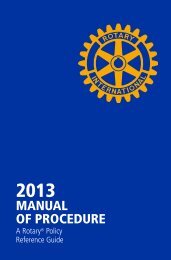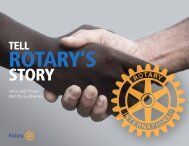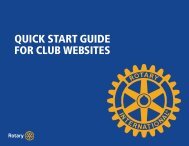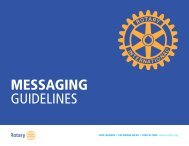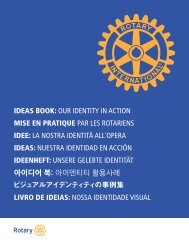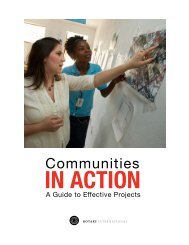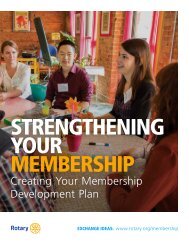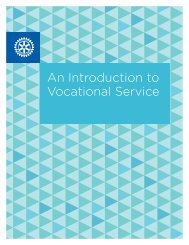Community Assessment Tools
Rotary International a companion piece to communities in action
Rotary International a companion piece to communities in action
Create successful ePaper yourself
Turn your PDF publications into a flip-book with our unique Google optimized e-Paper software.
1. Survey<br />
A survey is one of the best known and most popular methods<br />
of assessing a community’s strengths and weaknesses.<br />
Surveys can be simple, targeting only a small group of community<br />
stakeholders, or complex, sampling large segments<br />
of a population. An effective community survey can reveal a<br />
wealth of useful and easily quantifiable information and is a<br />
good option for many projects.<br />
Careful planning is one of the most important aspects of a<br />
successful survey. The design of most surveys begins with a<br />
statement of purpose, or why the survey is being conducted.<br />
This statement will help you determine what types of questions<br />
to ask, how the survey should be administered, and<br />
who should be asked to take it. In general, it’s best to keep a<br />
survey short, with easy-to-understand questions.<br />
Also consider how the survey will be delivered. A survey’s<br />
design will change depending on the method of delivery<br />
(phone, mail, email, website, in-person interview). Keep in<br />
mind how the people you want to reach tend to communicate.<br />
If few people in your community have Internet access,<br />
you might use a paper survey and consider conducting it at<br />
a common gathering point like a restaurant or a market. You<br />
may need to combine several delivery methods to get a clear<br />
picture of the community.<br />
Test your survey on a small group of people before distributing<br />
it to your target audience. This will help you identify<br />
poorly worded questions or flaws in the survey’s design that<br />
might result in inaccurate information.<br />
Interviewing Tips<br />
¢ Give survey participants enough time to answer questions<br />
thoroughly.<br />
¢ Listen carefully to participants’ responses, and respect<br />
their opinions.<br />
¢ Avoid overly personal questions that may make<br />
respondents uncomfortable and less willing to participate.<br />
¢ Assure respondents that their answers are confidential,<br />
and maintain that confidentiality.<br />
Survey session plan<br />
This session plan for conducting an assessment survey at a community<br />
meeting can be adapted to fit your club’s specific needs.<br />
Objective<br />
Identify the opinions of neighborhood residents about the<br />
development of a vacant lot in their neighborhood.<br />
Time<br />
30-45 minutes, depending on survey length<br />
Preparation<br />
Ask a small sample group to take the survey and test it for<br />
mistakes, unnecessary or flawed questions, and possible<br />
points of confusion. Choose a convenient meeting location<br />
for neighborhood residents, and arrange to use it for a community<br />
meeting. Invite community members to participate<br />
in the meeting.<br />
Materials<br />
For participants<br />
• Survey questionnaire<br />
• Pens or pencils<br />
• Tables, clipboards, or other writing surface<br />
For facilitators/organizers<br />
• Bins to collect survey responses<br />
Procedures<br />
1. Before the session begins, place collection bins by<br />
the exits or in a convenient place for participants to<br />
return their surveys.<br />
2. Introduce yourself and explain the purpose of the<br />
assessment. (2-3 minutes)<br />
3. Distribute the survey and writing instruments to<br />
participants. Briefly review the survey instructions<br />
and answer participants’ questions. (5-10 minutes)<br />
4. Allow participants enough time to complete the<br />
survey. (15-30 minutes)<br />
5. Thank participants. (5 minutes)<br />
<strong>Community</strong> <strong>Assessment</strong> <strong>Tools</strong> 1




